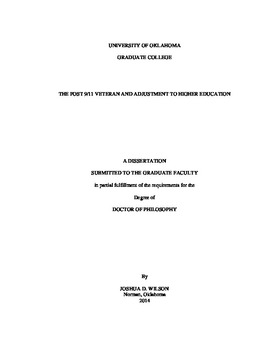| dc.contributor.advisor | Beesley, Denise | |
| dc.contributor.author | Wilson, Joshua | |
| dc.date.accessioned | 2014-05-13T21:42:45Z | |
| dc.date.available | 2014-05-13T21:42:45Z | |
| dc.date.issued | 2014-05-09 | |
| dc.identifier.uri | https://hdl.handle.net/11244/10406 | |
| dc.description.abstract | Abstract
This study was designed to explore the extent to which perceived alienation, level of post-traumatic stress and co-morbid traumatic brain injury, and level of grit influence veteran students’ (n = 60) reported motivation toward higher education. Additionally, it also examined traditional (n = 57) and non-traditional (n = 36) college students’ attitudes toward veteran student peers. For the traditional student sample, results revealed positive, significant correlations between academic amotivation and perceived alienation, post-traumatic stress, and TBI symptoms. Non-traditional students reported positive, significant relationships between amotivation and TBI symptoms. Veteran students reported positive, significant relationships between perceived alienation and post-traumatic stress, and TBI symptoms. Level of grit was found to be significantly lower in traditional students when compared to non-traditional and veteran students. Specific to the veteran student sample, symptoms of TBI were the greatest predictor of amotivation. | en_US |
| dc.language | en_US | en_US |
| dc.subject | Psychology, General. | en_US |
| dc.title | The Post 9/11 Veteran and Adjustment to Higher Education | en_US |
| dc.contributor.committeeMember | Stoltenberg, Cal | |
| dc.contributor.committeeMember | Linck, John | |
| dc.contributor.committeeMember | Crowson, Howard | |
| dc.contributor.committeeMember | Williams, Leslie | |
| dc.date.manuscript | 2014-05-09 | |
| dc.thesis.degree | Ph.D. | en_US |
| ou.group | Jeannine Rainbolt College of Education::Department of Educational Psychology | |
